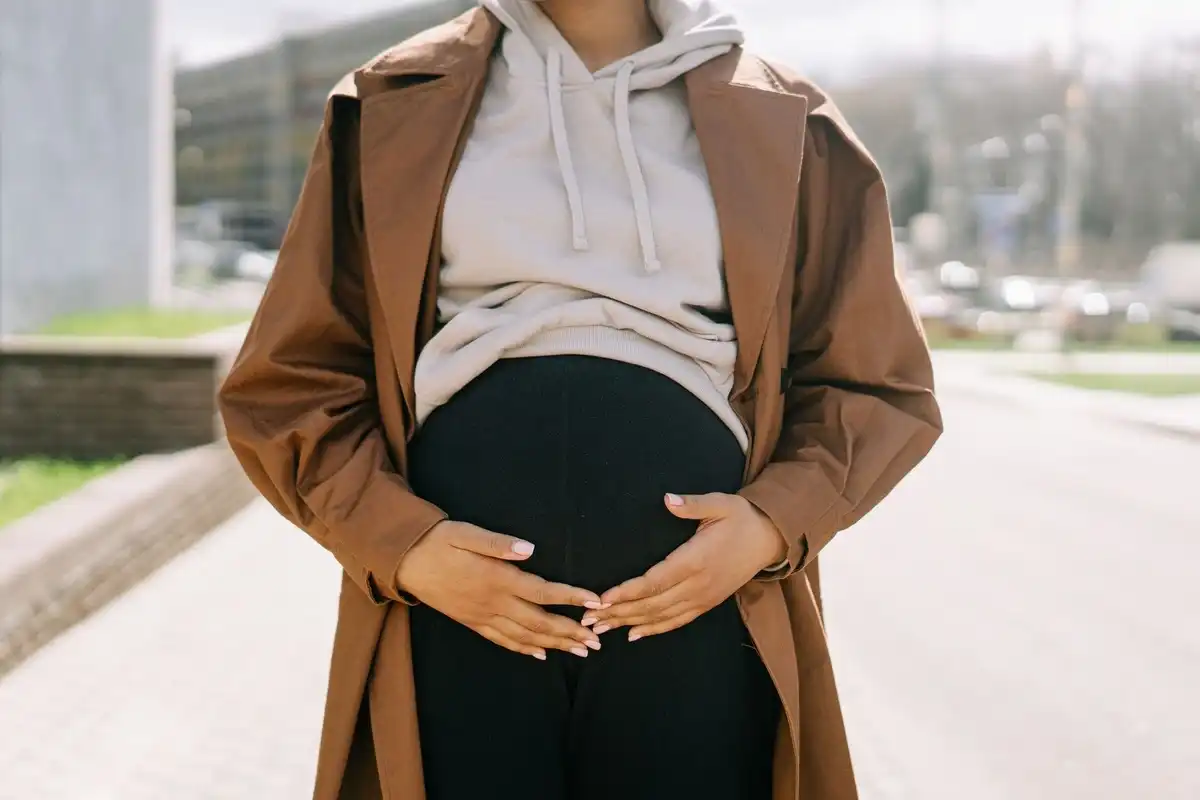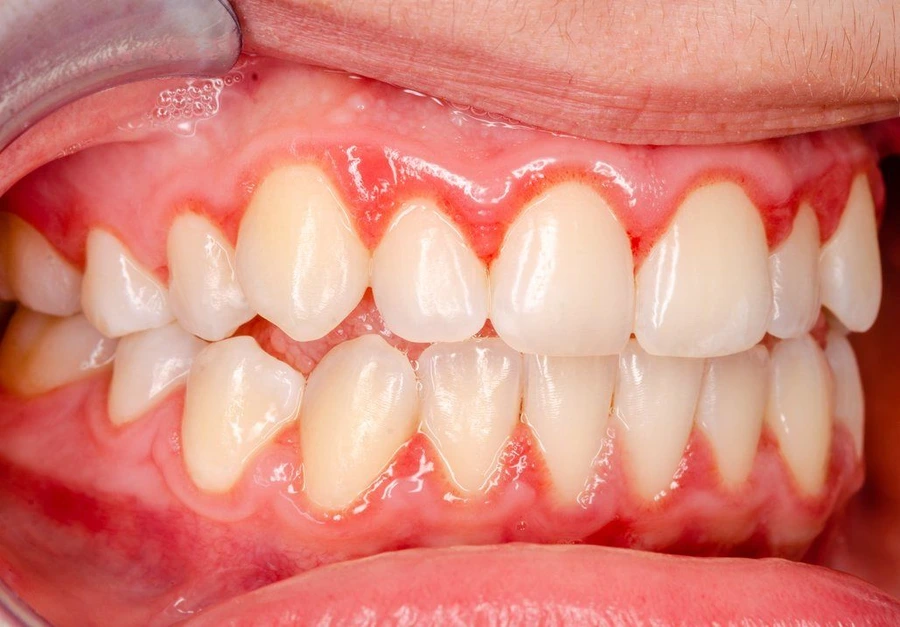Can Pregnancy Cause Tooth Loss? Loose & Crumbling Teeth


Are pregnancy, teeth loss, and other issues like enamel erosion interrelated? Some women claim that their teeth feel loose during pregnancy, or that they never had problems with their oral health until they became pregnant. It seems as if their smile was a ticking time bomb. If you have teeth crumbling during pregnancy, there could be a variety of reasons why. Some are serious, while others are coincidental.
Your tooth enamel is the hardest substance in your entire body. Yet some women claim that their baby seems to “sucks” the calcium from their enamel during pregnancy. Can that actually happen? And if so, is that why your teeth are breaking?
Teeth During Pregnancy
Common Symptoms
Anytime someone complains about teeth crumbling (during pregnancy or not), some of the first symptoms to look for will include:
- Past history of decay
- Multiple aging dental fillings
- Habits like teeth clenching and grinding
- TMJ disorder
- Stress, caffeine use, and other lifestyle factors
- Enamel erosion
- Developmental anomalies in teeth
- Untreated tooth decay
- Substance use or abuse
- Sleep apnea
- Sharp, flattened, or chipped teeth
Hormonal changes themselves are not a risk factor for pregnancy teeth loss or having teeth feel loose during pregnancy. If you’re experiencing any of these symptoms, it’s crucial to address the coexisting condition before it gets any worse.
Crumbling Teeth
What causes crumbling teeth? Could calcium loss lead to teeth crumbling during pregnancy? Likely not. If it were, your bones would be deteriorating too. However, the breakage and erosion that you’re experiencing are definitely due to some type of weakness in your teeth
Perhaps you don’t have any old fillings or crowns, but it’s been a while since you saw a dentist. You could have untreated tooth decay lurking in areas where it’s not visible. These sites can cause teeth crumbling during pregnancy. Especially with changes in your diet, an uptick in heartburn, or if you’ve struggled with nausea from the hormonal changes.
What To Do If Teeth Feel Loose Or Break
Tooth loss and broken teeth are common dental emergencies. But they’re not a common side effect of pregnancy. Teeth loss — especially when you’re young and healthy enough to be pregnant — is usually due to disease or trauma to that area
Loose Teeth
For loose teeth:
- Avoid chewing on that area
- Floss daily to prevent spread of gum disease
- Brush the gumlines twice per day
- Do not attempt to wiggle or feel how loose the tooth is
- Schedule a dentist’s appointment as soon as possible
Broken Teeth
Teeth crumbling during pregnancy is different than the typical chipped or broken tooth you would see from an accident. Fractured teeth during gestation are usually because of underlying decay or old fillings that need to be updated. Yes, it’s fine to repair your broken or crumbled tooth, even if you’re pregnant.
If your tooth breaks:
- Avoid chewing on that side of your mouth.
- See a dentist as soon as you can.
- Ask to have the area repaired (even if it’s something temporary until you have the baby).
- Don’t use pain as a determining factor for treatment.
- *Remember that broken teeth will continue to break down further until restored by your dentist.
What Causes Dental Problems During Pregnancy?
Why is it that so many women complain of never having problems with their teeth until they’re pregnant? Even though experts at the ADA say there’s no proof that babies “suck calcium” away from a mother’s teeth when they’re pregnant or nursing, there are other reasons why dental problems can flare up at times like these.
Most expectant mothers will experience at least some form of morning sickness early on during their pregnancy. As they approach their due date, other conditions like heartburn tend to flare up because of the extra pressure on their GI tract. Both of these scenarios create a prime environment for acid erosion at already weakening teeth. This process could essentially speed up the deterioration of areas where there are already cavities, cracks, or aged dental restorations.
Plus, there are the typical dietary changes that come along with being pregnant. More frequent snacking means a higher exposure to dental plaque and acidic byproducts compared to eating three times per day. If you’re not rinsing your mouth out with water and brushing regularly, all of that extra nibbling can accelerate the tooth decay process.
When you have both of those conditions compounded with aging dental work or excessive clenching and grinding, it’s a recipe for major dental problems when pregnant. Sudden emergencies could occur at any time, leaving you with a split or fractured tooth.
The dental problems women seen during pregnancy isn’t because of a natural weakening process or their baby “taking” the minerals from their teeth. It’s a variety of lifestyle changes, timing, past oral hygiene habits, and their unique dental history. By creating the “perfect storm” so to speak, it just so happens that dental problems like crumbling or loose teeth can become more evident while you’re expecting.
SIDE NOTE: What about hormonal changes? Most hormone-induced dental conditions are related to gum inflammation. Women may see signs of gingivitis, bleeding gums, or even small “pregnancy tumors” on their gums. Thankfully, these tend to run their course after you give birth, as long as you’re brushing and flossing regularly.
When To See A Doctor Or Dentist
It’s best to go ahead and have your dental concerns treated as soon as possible. That way any compromised teeth won’t continue to deteriorate or break up further. You’ll get to enjoy a smaller and more affordable treatment by addressing it early.
Yes: it’s completely safe to see a dentist for checkups and treatment during your pregnancy. Generally speaking, there are certain types of dental services that may be better scheduled during your second trimester. But usually that’s because of issues like morning sickness, your comfort reclining in a dental chair, or what stage of development your baby is in. Your dentist will work with you and your OBGYN to determine if any additional precautions need to be taken.
Preventing Tooth Loss
Periodontal (gum) disease is the leading cause of tooth loss. It’s also preventable.
If you notice signs of swollen gingiva, bleeding, or sensitive gums, you’ll need to make sure you’re brushing and flossing each day. Angle your toothbrush toward your gumlines, making small strokes on one or two teeth at a time. When flossing, wrap the strand tightly against the side of the tooth and slide up and down just under the gums. Do this daily. The symptoms should reverse in two weeks if it’s only mild gingivitis.

Are you starting to exhibit signs of loose teeth in addition to early gum disease? Or are your gum disease symptoms not improving with home care? Then you need to seek out professional dental treatment. Tooth mobility is caused by loss of attachment around the root, including bone shrinkage. Any time those attached areas are compromised, the oral bacteria can spread into your bloodstream. Depending on the severity of structural loss and infection, your dentist can plan a series of deep cleanings or bone grafting to prevent loose teeth from falling out altogether.
Maybe you’ve not yet started to develop significant chipping or crumbling teeth. But if you know you’re prone to clenching and grinding, that could change. Pregnancy may be a stressful time for some women. Sleeping in a professionally fitted mouthguard can safeguard your smile. The customized fit will keep it in place while you’re sleeping (and comfortably, at that) while buffering the pressure of tooth-on-tooth wear. It’s a smart piece of insurance against premature tooth loss.
Teeth During Pregnancy Overview
Pregnancy is an exciting time. It’s also a reflection that your body is doing what it’s supposed to do. But if you have issues like teeth crumbling during pregnancy, or your teeth feel loose during pregnancy, there’s something else going on. Pregnancy teeth loss is not common. That being said, the changes your body is going through can be the tipping point for undiagnosed or untreated dental problems going on in the background.
If you’re pregnant, it’s completely safe — and recommended — to seek out prenatal dental care. Especially if you have noticed.

Make your inbox smile!
Subscribe






